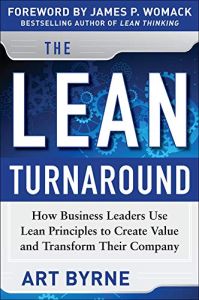Únase a getAbstract para acceder al resumen.

Únase a getAbstract para acceder al resumen.
Art Byrne
The Lean Turnaround
How Business Leaders Use Lean Principles to Create Value and Transform Their Company
McGraw-Hill, 2012
¿De qué se trata?
Lean can transform any business.
Recommendation
Author Art Byrne, operating partner at the private equity firm J.W. Childs Associates, has been implementing Lean management at various firms for more than 30 years. He discusses how to make the most of Lean’s benefits, including improved profitability, efficiency, productivity and savings plus increased enterprise value. Byrne explains that Lean tactics can transform any service company or factory, but stresses that traditional executives often oppose it. That’s one reason, Byrne says, that fewer than 10% of Lean adoptions succeed. He includes savvy recommendations on how your firm’s Lean proponents – who must include your CEO – can bypass naysayers and make the most of Lean’s streamlined methods.
Summary
About the Author
Art Byrne, the operating partner at the private equity firm J.W. Childs Associates, also wrote The Lean Turnaround Action Guide.




















Comment on this summary